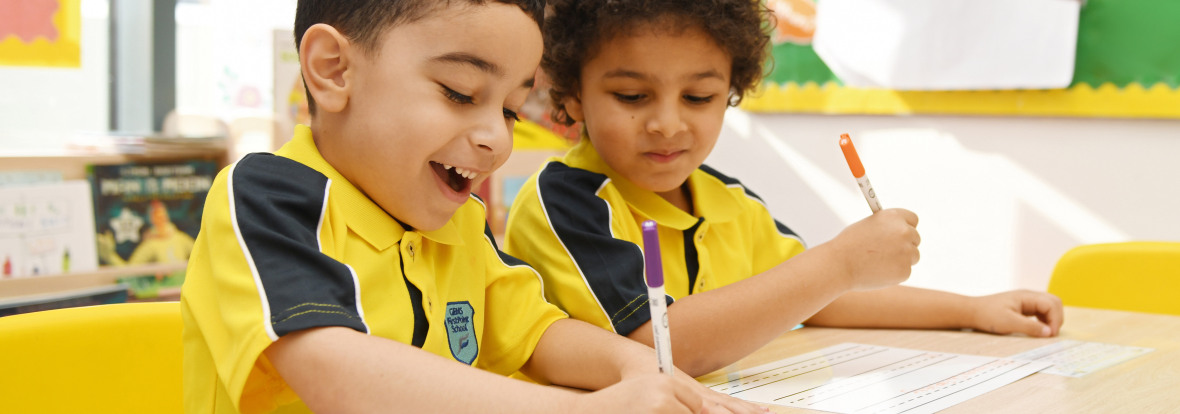It’s never too early to start thinking about the right school for your child. And it’s never too early to start considering what curriculum might provide the best fit. But that doesn’t make the selection process and the decision any easier!
As with all big decisions, however, it’s good to be as informed as possible. Putting in the time to research and understand the options available will pay off and ultimately help to ensure your child’s journey through school is happy, fulfilling, and successful.
So, what are the best curriculum options in the UAE? Read on to find out.
National Curriculum for England
Also commonly referred to simply as the ‘British curriculum’, the NCfE is taught in over 150 countries around the world and is one of the most popular educational systems in the Emirates.
The curriculum is renowned for its rigour and academic excellence, and it is recognised and accepted by universities and employers around the world. Leading to well-respected GCSE and A-level qualifications at age 16 and 18 respectively, it will open an abundance of doors and opportunities when your child finishes school.
This is a broad and balanced system, which covers arts, sciences and humanities. With a wide-angle view and a liberal approach, the British curriculum is effective in keeping track of progress and encouraging achievement all the way from primary school to university level. Rigorous and well-organised, it has been designed to give students, parents, and teachers a clear overview of progress at every stage of education.
The NCfE promotes independent critical thinking and creativity. Your child will study all core subjects, focusing on creative thinking, forward planning, and developing those all-important life skills. Ultimately, this is a curriculum designed to help young people meet the challenges of a changing world.
British Curriculum schools in and outside the UK work to encourage debate and discussion. Teachers are trained to develop active, inquisitive learners and to help students voice their own ideas with confidence. With equal emphasis on both independent and group work, it has one core goal: to help young people flourish academically and personally within a flexible system.
International Baccalaureate
In essence, the non-profit IB aims to develop inquiring, knowledgeable, and caring young people who help to create a better and more peaceful world through intercultural understanding and respect.
Developed in 1968 in Switzerland, the IB began as an education programme for globe-trotting students and their families. Today, almost 60 years later, the IB is taught to nearly two million students in some 5,000 schools in 150 countries. In fact, it’s the fastest growing education system on the planet, recognised by universities, higher education institutions, and employers the world over.
The IB has a strong international dimension, making it ideal for expatriate families and those looking for a globally recognised education leading to highly transferable qualifications that will open doors no matter where in the world they may find themselves.
Broad, balanced, conceptual, and connected, the IB is made up of four programmes – the Primary Years Programme (PYP), Middle Years Programme (MYP), Diploma Programme (DP), and Career-related Programme (CP). It thereby offers pathways that cater to theoretical, practical, and vocational learners.
All four IB programmes require study across a broad range of subjects. All emphasise the learning of languages, focus on developing the skills of learning, and provide opportunities for individual and collaborative projects, planning, and research.
IB programmes focus on moving beyond awareness and understanding to engagement, action, and bringing about meaningful change. They provide a higher level of cognitive challenge, beyond content knowledge and understanding, leading to evaluation, synthesis, and creativity.
American Curriculum
The American curriculum emphasizes molding students into individuals who excel not just in academics, but also sports and extracurricular activities.
While there is no central American curriculum, the common themes of enquiry-based learning and student-centred planning run throughout. This has made US schools in Dubai and Abu Dhabi popular choices, particularly for students wishing to pursue higher education in North America.
The American curriculum has a broad and balanced approach that places academic importance on all subjects, supported by a wide range of co-curricular activities, thereby equipping students with the skills they need to thrive in the 21st century.
American international school students start with kindergarten at age five before graduating high school at age 18 in Grade 12, when they are awarded the American High School Diploma. The Diploma is accepted for admission by all US universities and colleges and is increasingly recognized by other universities around the world as well.
Indian Curriculum
There are two key versions of the Indian curriculum, both of which are becoming increasingly recognized and accepted outside India: the CBSE (Central Board of Secondary Education) and the CISCE (Council for the Indian School Certificate Examinations).
Designed and developed by the National Council of Educational Research and Training in New Delhi, the CBSE curriculum prepares students for the All India CBSE Secondary Schools Examination at age 16 (end of Grade 10) and the All India Senior School Certificate Examination at age 18 (end of Grade 12).
The CBSE curriculum is offered in numerous countries around the globe and is known to be the ideal springboard for success in India’s competitive exams for elite engineering and medical institutions. Students of this curriculum in the UAE have also gone on to excel in universities around the world.
The CISCE curriculum prepares students for the ICSE (Indian Certificate of Secondary Education) examination in Grade 10 and the ISC (Indian School Certificate) examination in the final year of secondary school in Grade 12.
The CISCE curriculum focuses on practical skills and a complete approach to education, which emphasizes not just the sciences but also the arts, languages, and humanities. Known for its keen focus on English-language skills and its broad and in-depth scope of studies, the CISCE stream is often cited for its exacting standards of excellence.
Explore further and find the right school
To delve deeper into the curriculum options available in the UAE and to discover the top schools for each, visit GEMS education.
To learn more, please contact your dedicated GEMS relationship Manager here






